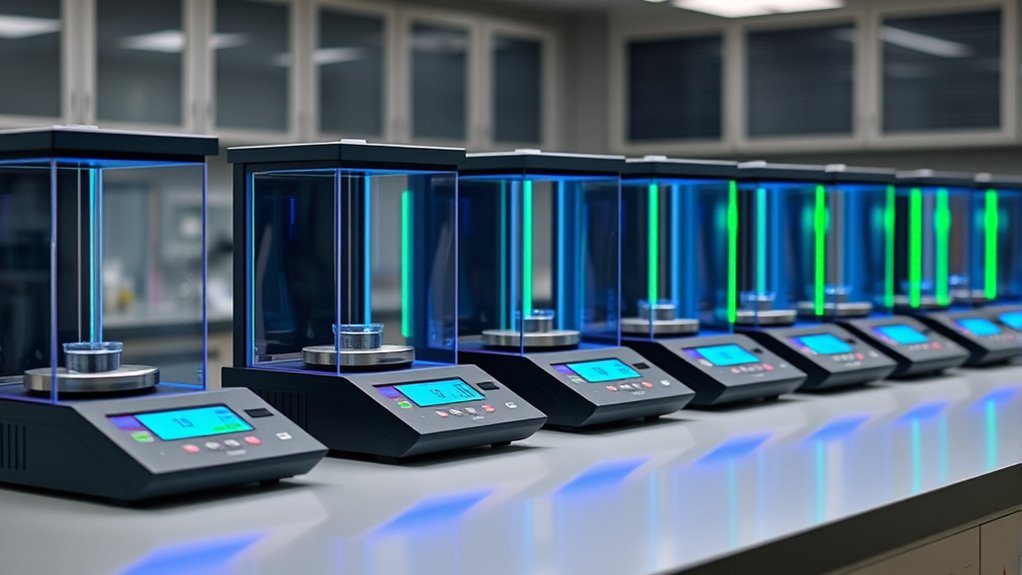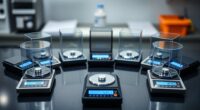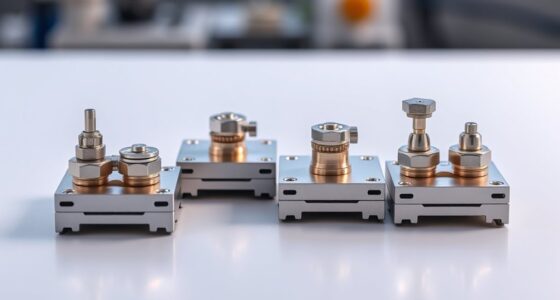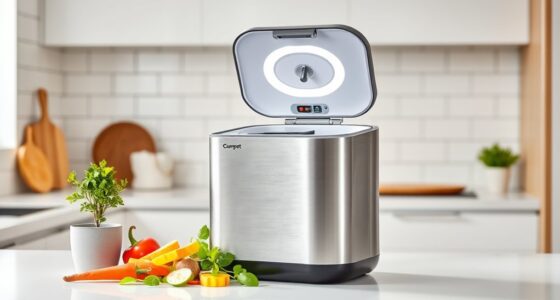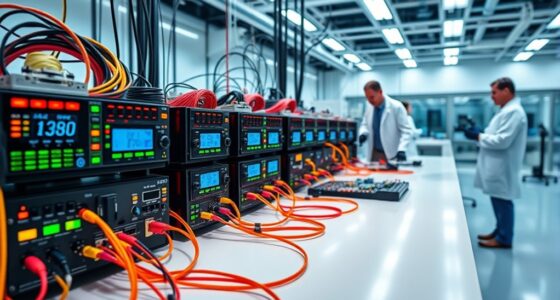If you’re looking for the top high-precision analytical balances in 2025, I recommend models like AGCN120, ATN110A, and CGOLDENWALL for their accuracy down to 0.0001g, perfect for laboratory or jewelry work. Larger scales like the Lab Scale 5000g offer reliable 0.01g precision for bulk measurements. Whether for research or industry, these balances combine stability, durability, and advanced features. Keep exploring further to see which options might best meet your needs.
Key Takeaways
- Prioritize balances with high readability (0.0001g to 0.001g) for maximum measurement accuracy in 2025.
- Consider models with durable construction, stable leveling, and environmental shielding to ensure consistent results.
- Opt for balances supporting data transfer via USB or RS232 for efficient data management and integration.
- Evaluate calibration features, including internal and external calibration options, for maintaining precision over time.
- Choose balances with appropriate capacity and resolution tailored to specific scientific or laboratory measurement needs.
AGCN120 Analytical Scale (120g x 0.0001g)
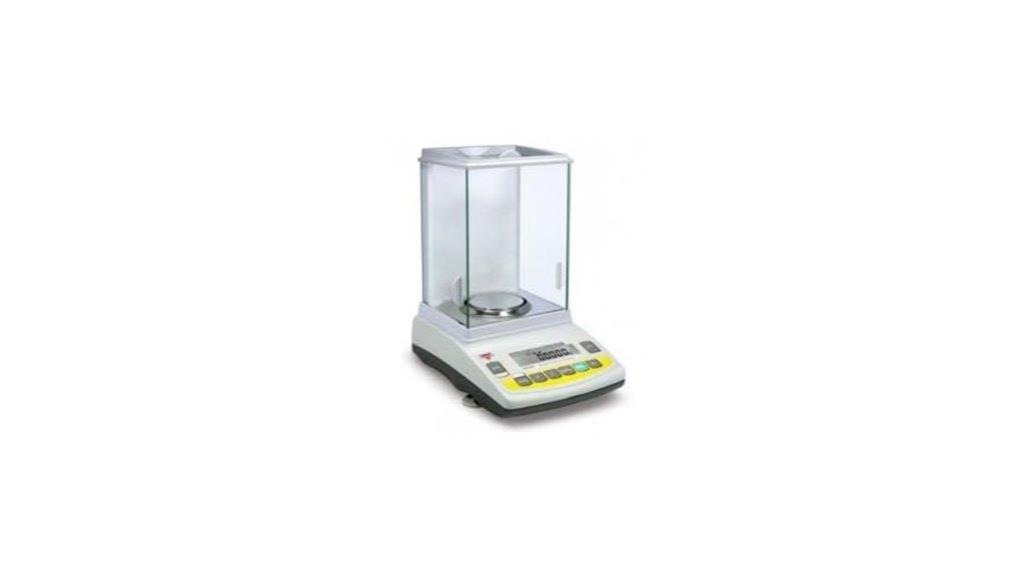
If you need pinpoint accuracy for small samples, the AGCN120 Analytical Scale is a top choice. With a 120-gram capacity and a remarkable readability of 0.0001 grams, it guarantees precise measurements every time. Its electromagnetic load-cell and die-cast metal housing provide durability and stability. Automatic internal calibration keeps measurements consistent, while the large LCD display makes operation straightforward. Connecting to your PC via USB or RS232 is quick and simple, facilitating seamless data export. With eight weighing modes and nine units, this scale adapts to various applications, making it an essential tool for high-precision work.
Best For: users requiring ultra-precise measurements for small samples in laboratories, research, or quality control environments.
Pros:
- Exceptional readability of 0.0001g ensures high-precision measurement
- Automatic internal calibration maintains measurement accuracy over time
- Easy connectivity with USB and RS232 for quick data transfer
Cons:
- Limited weight capacity of 120g may not suit larger samples
- May require careful handling due to sensitive measurements and durable build
- The specialized features might be more than necessary for casual or non-professional use
ATN110A Analytical Balance (110g x 0.0001g)
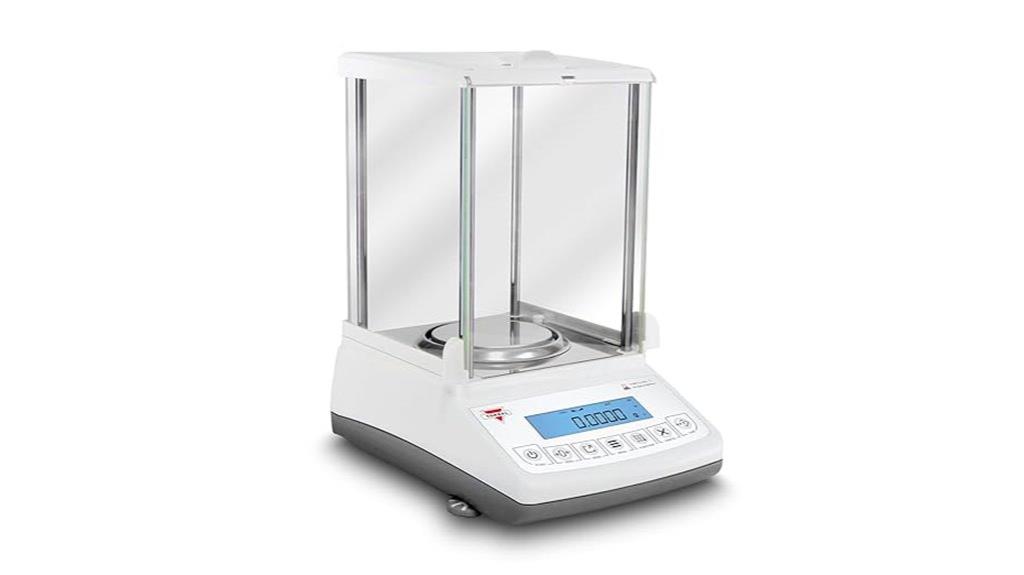
The ATN110A Analytical Balance stands out for its exceptional precision, making it ideal for laboratories and jewelers who require measurements accurate to 0.0001 grams. With a 110g capacity and true Class I laboratory-grade accuracy, it features automatic internal calibration and a three-way access weighing chamber. Its compact design measures just 11 x 7 inches, with a durable ABS housing, draft ring, and stainless steel pan. Equipped with an electromagnetic load cell, it supports multiple weighing functions and nine units of measure. Connectivity options like USB and RS232 make data transfer easy. Despite occasional outliers, it consistently delivers reliable, traceable measurements for delicate and critical applications.
Best For: laboratory professionals, jewelers, and researchers needing highly precise measurements up to 0.0001 grams with reliable connectivity and traceability.
Pros:
- Exceptional precision with readability of 0.0001g, suitable for delicate measurements
- Automatic internal calibration ensures consistent and traceable results
- Compact, durable design with multiple connectivity options like USB and RS232
Cons:
- Occasional outliers up to 50mg may require repeated measurements or verification
- Manual instructions and interface can be less intuitive for complex functions
- Auto-calibration delays or errors if overused, requiring careful handling and maintenance
CGOLDENWALL 0.1mg High Precision Analytical Balance

For those requiring exceptional measurement accuracy, the CGOLDENWALL 0.1mg High Precision Analytical Balance stands out with its electromagnetic force compensation technology, ensuring precise results even at the smallest scales. With a maximum capacity of 300 grams and a readability of 0.0001 grams (0.1mg), it delivers reliable measurements across various applications. Crafted from durable ABS and stainless steel, it features a three-side windglass for stability. The LCD display, tare function, counting mode, overload protection, and fault indicator enhance usability. Plus, the RS232 interface simplifies data transfer to printers or computers, making it a versatile tool for precise scientific work.
Best For: researchers, laboratory technicians, and professionals requiring highly precise measurements for scientific, pharmaceutical, or quality control applications.
Pros:
- Achieves 0.1mg high precision with electromagnetic force compensation technology for reliable accuracy.
- Durable construction with ABS body, stainless steel platter, and windglass for stability and longevity.
- Equipped with user-friendly features like LCD display, tare, counting mode, and RS232 interface for easy operation and data management.
Cons:
- Maximum capacity of 300g may be limiting for heavier sample weighing needs.
- Requires careful handling and calibration to maintain precision at the 0.1mg level.
- The sophisticated features and technology may result in a higher price point compared to simpler balances.
Lab Scale 5000g x 0.01g Digital Analytical Balance
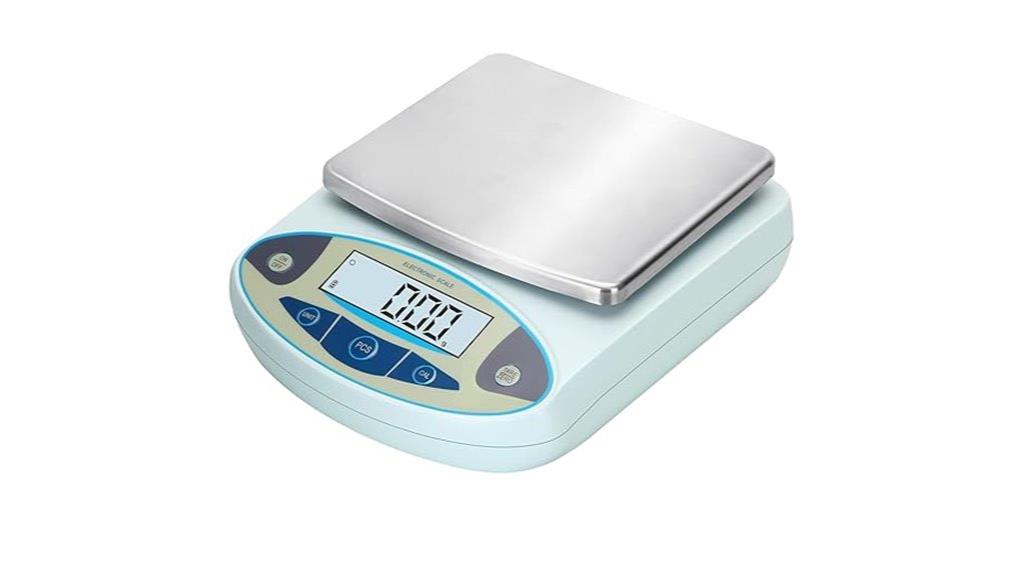
A standout choice for those needing precise, reliable measurements up to 5000 grams is the Lab Scale 5000g x 0.01g Digital Analytical Balance. It offers high accuracy with 0.01g resolution, making it suitable for scientific, industrial, and commercial use. Constructed with durable stainless steel and a large weighing pan, it ensures stability and easy handling of various items. Features like tare, self-calibration, memory, and multiple unit conversions enhance usability. Although calibration weights aren’t included, it’s pre-calibrated and straightforward to adjust. Overall, this balance combines precision, durability, and versatility for demanding measurement tasks.
Best For: professionals and hobbyists needing precise, reliable measurements up to 5000 grams in scientific, industrial, pharmaceutical, or culinary applications.
Pros:
- High accuracy with 0.01g resolution suitable for sensitive measurements.
- Durable construction with stainless steel and a large weighing pan for versatile use.
- Multiple functions including tare, self-calibration, memory, and unit conversions for convenience.
Cons:
- Calibration weights are not included, requiring separate purchase for recalibration.
- Slightly larger size may require ample space for setup.
- Moving plate design could benefit from minor improvements for smoother operation.
VEVOR Lab Scale, 500g x 0.001g Precision Analytical Balance
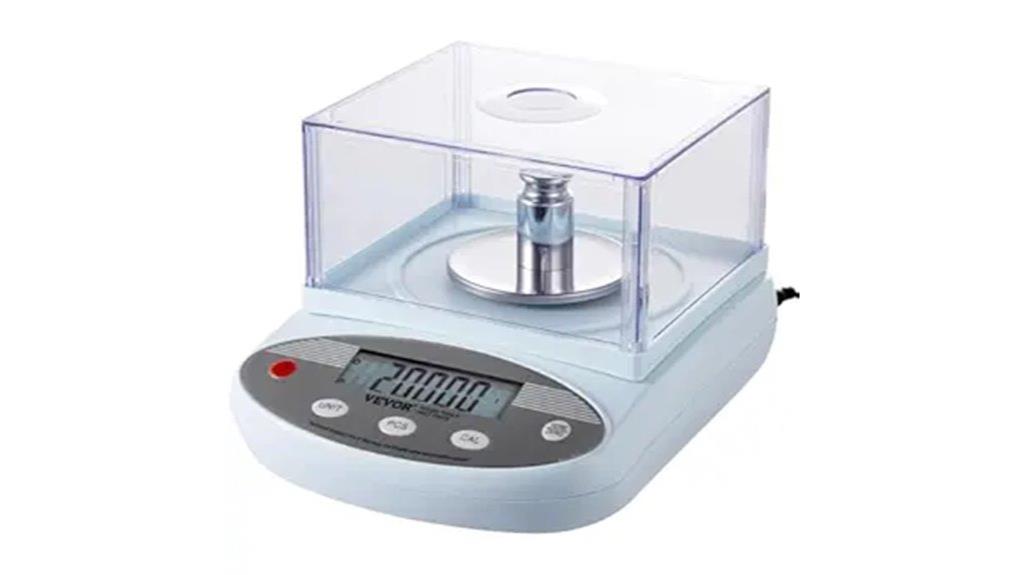
If you need reliable, high-precision measurements in a professional setting, the VEVOR Lab Scale stands out with its 0.001g accuracy and versatile features. It includes a 200g calibration weight, ensuring fast, consistent results for scientific, laboratory, or commercial tasks. The clear LCD display offers 13 unit conversions, while the stainless steel tray reduces airflow interference and is easy to clean. Built with durable, rust-proof materials, it’s ideal for jewelry weighing, coin counting, and lab experiments. Most users find it straightforward to calibrate and operate, delivering stable, precise results, making it an excellent choice for demanding environments.
Best For: professionals and researchers who require precise, reliable measurements for laboratory experiments, jewelry weighing, coin counting, and commercial applications.
Pros:
- High accuracy of 0.001g with reliable calibration using included weights
- Durable, rust-proof stainless steel tray that is easy to clean
- Versatile with 13 unit conversions and user-friendly touch controls
Cons:
- Short battery life requiring frequent recharging or battery replacement
- Slight difficulty in cleaning due to tray design
- Some users received models with 0.01g accuracy instead of 0.001g as advertised
Bonvoisin Lab Scale 3000g x 0.01g Digital Scientific Balance

The Bonvoisin Lab Scale 3000g x 0.01g Digital Scientific Balance stands out for its exceptional precision and versatility, making it an ideal choice for laboratories, jewelry shops, and research facilities that demand accurate measurements. With an accuracy of 0.01g and eight selectable ranges from 200g to 5000g, it adapts to various weighing needs. Its stainless steel pan and non-slip mat ensure stability and durability. Features like a large LCD display, tare, memory, counting, and external calibration make it user-friendly. Supporting 13 units, including grams, carats, and ounces, it combines accuracy with convenience for professional applications.
Best For: professionals in laboratories, jewelry shops, and research facilities requiring precise and reliable measurements across various weight ranges.
Pros:
- High-precision measurement with 0.01g accuracy and multiple selectable ranges for versatility.
- Durable stainless steel pan combined with a non-slip mat enhances stability and longevity.
- User-friendly features such as large LCD display, tare, memory, counting functions, and external calibration.
Cons:
- Calibration weights for the 5000g range are not included, which may require additional purchase.
- The scale’s maximum capacity of 3000g may not suit heavier weighing needs.
- Potential sensitivity to environmental factors if not properly leveled or placed on a stable surface.
Fristaden Lab Analytical Balance (210 g x 0.1 mg)

When accuracy matters most, the Fristaden Lab Analytical Balance stands out with its impressive 210 g capacity and 0.1 mg (0.0001 g) precision, making it ideal for professional laboratories that require detailed measurements. It features easy tare and counting functions, external calibration, and an RS-232 port for seamless data transfer. The glass windshield stabilizes readings and protects against drafts. Verified for high accuracy with calibration weights, it offers professional-grade performance at a fraction of the cost of similar balances. Built by Fristaden Lab, an established American company, it includes a one-year warranty and dedicated support for reliable, precise measurements.
Best For: professional laboratory technicians and researchers who require highly precise measurements for analysis and compounding tasks.
Pros:
- Highly accurate with 0.1 mg (0.0001 g) precision, suitable for detailed analytical work.
- Includes useful features such as tare, counting mode, external calibration, and RS-232 data transfer.
- Compact design with adjustable feet and a glass windshield for stability and protection.
Cons:
- Limited capacity of 210 g may not accommodate larger samples.
- Requires calibration weights and proper setup for optimal accuracy.
- Professional-grade features may be more complex for casual or non-specialist use.
LICHEN Lab Scale 100g x 0.001g Analytical Balance with Digital Display

Designed for laboratory professionals and precision-oriented users, the LICHEN Lab Scale 100g x 0.001g Analytical Balance stands out with its high-precision sensor and rapid response time. It delivers accurate measurements up to 0.001g, making it ideal for chemical, pharmaceutical, and scientific applications. The built-in high-sensitivity sensor provides early overload warnings, protecting the device. Its transparent plastic windshield reduces airflow interference, ensuring stable readings. The stainless steel weighing pan resists rust and corrosion. With an easy-to-read LCD, tare and counting functions, and adjustable leveling features, this balance offers reliable performance and user-friendly operation in diverse laboratory environments.
Best For: laboratory professionals, chemists, pharmacists, and researchers requiring precise and reliable small-scale measurements.
Pros:
- High-precision sensor provides accurate readings up to 0.001g.
- Durable stainless steel weighing pan resists rust and corrosion.
- User-friendly features like tare, counting functions, and adjustable leveling ensure easy operation.
Cons:
- Limited to a maximum capacity of 100g, not suitable for heavier weighing tasks.
- Requires a stable environment to maintain measurement accuracy despite airflow reduction features.
- May need calibration with calibrated weights periodically to ensure ongoing precision.
Lab Scale 5000gx0.01g Digital Laboratory Balance
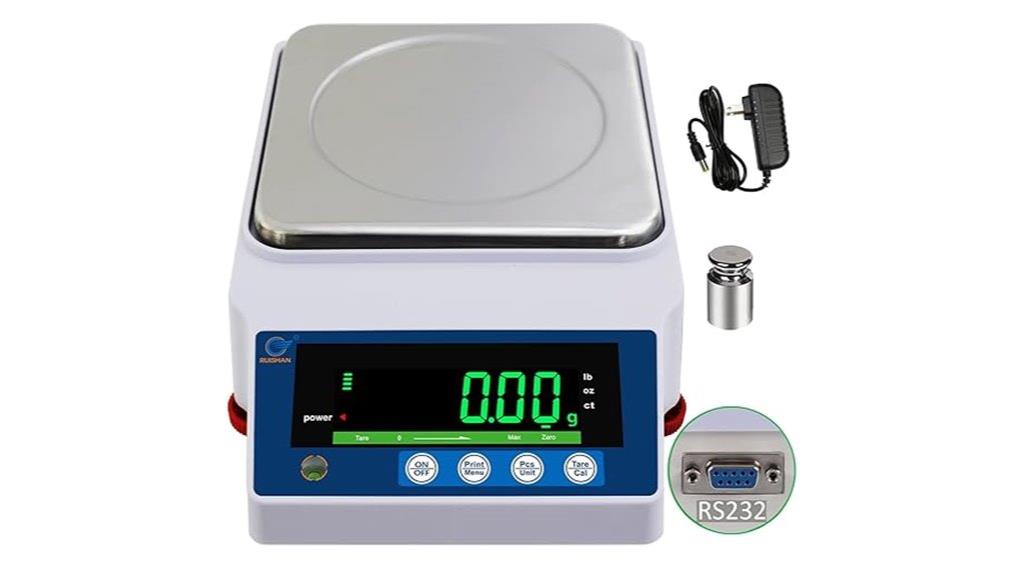
If you’re looking for a reliable lab balance that combines high accuracy with ease of use, the Lab Scale 5000gx0.01g Digital Laboratory Balance is an excellent choice. It provides quick, precise measurements thanks to its built-in high-sensitivity sensor and stable readings within seconds. The large stainless steel pan accommodates various items, while easy unit conversions make it versatile. Its durable design, calibration features, and user-friendly interface ensure consistent performance for labs, jewelry, or inventory tasks. Although some find the unit switching a bit tricky, overall, it offers dependable accuracy and straightforward operation for demanding measurement needs.
Best For: those seeking a highly accurate, durable lab balance suitable for scientific, jewelry, or inventory measurements with quick and stable readings.
Pros:
- High precision with 0.01g accuracy and stable results within seconds
- Large stainless steel pan suitable for various small items and chemicals
- Easy unit conversions among grams, ounces, carats, and pounds
Cons:
- Unit switching can be tricky and may require careful reading of instructions
- Interface and button functions may be confusing for some users
- Auto-scrolling display and limited manual controls can hinder straightforward operation
Lab Scale 5000g/0.01g Digital Analytical Balance
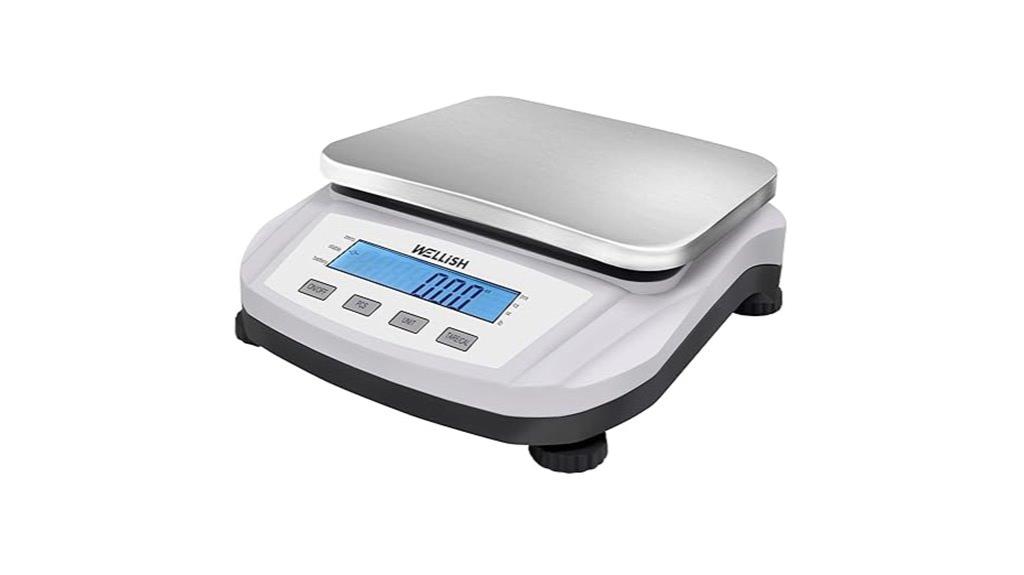
The Lab Scale 5000g/0.01g Digital Analytical Balance stands out as an ideal choice for professionals requiring precise measurements across various fields, from laboratories to industrial settings. Its high-sensitivity sensor delivers accurate readings down to 0.01g, ensuring reliable results for scientific, agricultural, or commercial tasks. The large stainless steel weighing pan provides stability during use, while the adjustable feet help level the device. With tare and counting functions, plus support for 17 units, it offers versatility. The LCD display makes readings easy, and the balance can be powered by a cord or batteries. Crafted from durable, corrosion-resistant materials, it’s built for dependable, long-term performance.
Best For: professionals and researchers in laboratories, industrial settings, agriculture, and education requiring precise, reliable measurements with versatile unit options.
Pros:
- High-precision sensor achieving 0.01g accuracy for detailed analytical work
- Large stainless steel weighing pan for stability and durability
- Supports multiple units (g, ct, oz, lb) with tare and counting functions for versatility
Cons:
- Battery not included, requiring an additional purchase for portable use
- Calibration weight not included, which may be necessary for precise calibration
- Relies on external power or batteries, which could limit mobility if power sources are unavailable
Lab Scale 5000g x 0.01g Electronic Analytical Balance

For those needing precise and reliable measurements up to 5000 grams, the Lab Scale 5000g x 0.01g Electronic Analytical Balance stands out with its high-sensitivity sensor and fast response time, assuring quick and accurate results. Its 0.01g accuracy suits laboratory, jewelry, and industrial applications. The balance features a large LCD display, multi-unit conversion, tare, auto-correct, memory, counting, and fault visualization functions. Made with durable stainless steel and aluminum components, it’s easy to operate and stable on various surfaces. The included calibration weight guarantees ongoing precision, while its overload alarm and support options guarantee dependable performance over time.
Best For: professionals and researchers in laboratories, jewelry makers, and industrial settings requiring precise measurements up to 5000 grams with 0.01g accuracy.
Pros:
- High-precision sensor ensuring accurate and reliable measurements
- Multi-unit conversion and additional functions like counting and auto-correct for versatile use
- Durable construction with stainless steel and aluminum components for stability and longevity
Cons:
- External RS-232 cable not included, requiring additional purchase for connectivity
- Slightly larger footprint may require ample space in tight environments
- Calibration weight included only for certain models, possibly necessitating extra calibration tools for others
AGZN120 Analytical Balance (120g x 0.0001g)
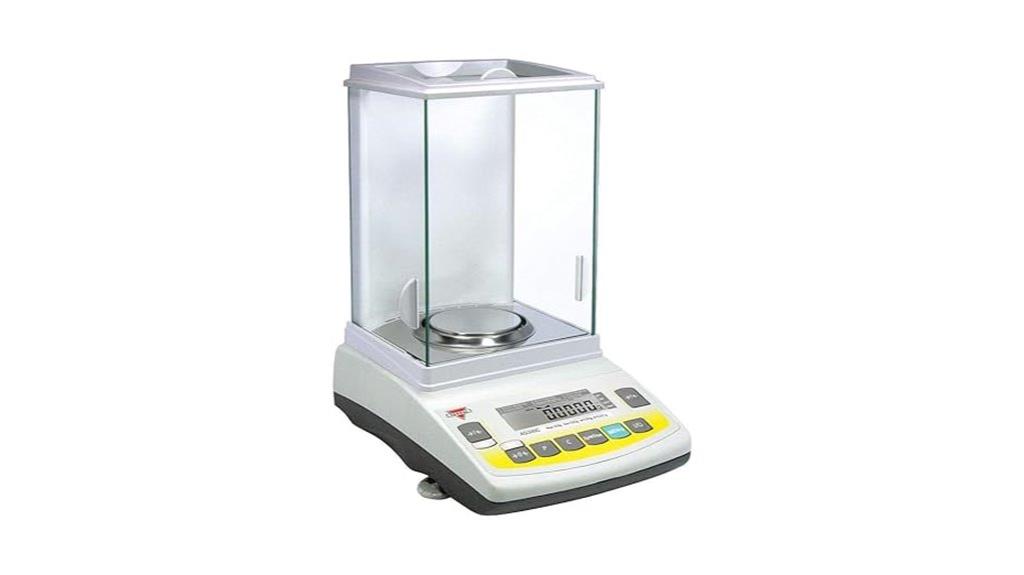
The AGZN120 Analytical Balance stands out for its impressive ability to measure up to 120 grams with a precision of 0.0001 grams—making it ideal for laboratories requiring highly accurate weight data. Its large LCD display and robust die-cast metal housing ensure durability and ease of use. Equipped with an electromagnetic load-cell and multiple weighing modes, it offers versatility for various applications. Results can be easily sent to a PC via USB, streamlining data management. While it provides consistent, reliable performance, some users report costly repairs and limited customer support, so purchasing from reputable vendors is advisable. Overall, it’s a solid choice for precise measurements.
Best For: laboratories and researchers requiring highly precise weight measurements up to 120 grams with 0.0001g accuracy.
Pros:
- Offers high-precision weighing with 0.0001g readability
- Durable die-cast metal housing ensures stability and longevity
- Multiple weighing modes and units provide versatile application options
Cons:
- Poor customer service experience reported by users
- Warranty does not cover load cell repairs, which can be costly
- Repairs for load cell issues can be expensive and time-consuming
LICHEN Lab Scale High Precision Digital Balance (120g, 0.1mg)

If you need precise measurements for small samples, the LICHEN Lab Scale High Precision Digital Balance is an excellent choice, thanks to its 0.1mg readability and 120g capacity. It uses advanced sensor technology for real-time, stable measurements and features overload protection to prevent damage. The scale supports quick unit conversions between grams and carats and offers four grade options—5, 10, 25, and 50—for efficient sample counting. Its built-in RS232C interface enables seamless data transfer to computers or printers. With a clear LCD display and accessories like windshields and weighing trays, it’s ideal for labs, pharmaceuticals, and food industries, ensuring reliable, high-precision results.
Best For: professionals and researchers requiring highly accurate measurements of small samples in laboratories, pharmaceuticals, chemicals, and food processing industries.
Pros:
- Achieves high precision with 0.1mg readability and supports a maximum capacity of 120g.
- Features advanced sensor technology for stable, real-time measurements and overload protection for durability.
- Offers versatile unit conversions, sample counting options, and seamless data transfer via RS232C interface.
Cons:
- Limited to small sample sizes with a maximum capacity of 120g, not suitable for larger weights.
- Requires proper calibration and maintenance to ensure continued accuracy, which may involve additional effort.
- May be more expensive than lower-precision or less feature-rich scales, potentially limiting budget-conscious users.
Lab Scale 600g x 0.001g High Precision Analytical Balance
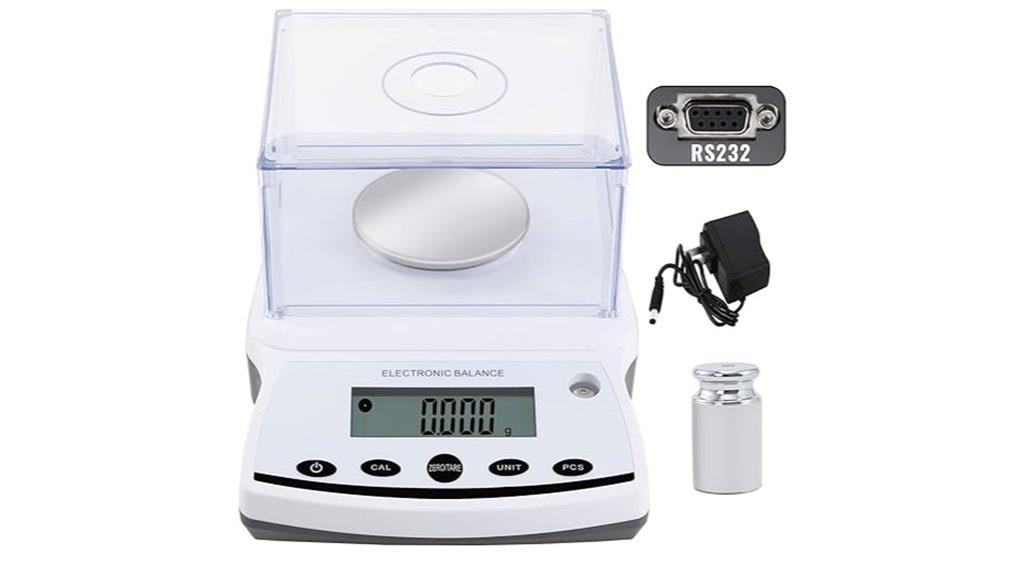
This lab scale stands out with its impressive 0.001g measurement accuracy and 600g capacity, making it ideal for professionals who require precise, reliable results in small-scale weighing tasks. It offers versatile functions like counting with free open-source software and tare weighing. The scale supports 13 unit conversions, including grams, carats, ounces, and pounds. Built with durable materials, it features external calibration, adjustable leveling, and a windshield for stability. The large LCD display and simple touch buttons ensure ease of use. With RS232 connectivity, data transfer to computers or printers is straightforward, perfect for laboratories, jewelers, and quality control environments.
Best For: professionals in laboratories, jewelers, and quality control environments requiring precise, reliable small-scale weighing with versatile unit conversions and data connectivity.
Pros:
- High precision of 0.001g with a 600g capacity for accurate measurements
- Multiple functions including counting, tare weighing, and 13 unit conversions
- Durable construction with external calibration, leveling, and RS232 data transfer options
Cons:
- AC power or 9V battery required; battery not included, which may inconvenience some users
- Sensitive to environmental factors; may require a quiet, airtight space for optimal performance
- External calibration with a 200g weight may be less convenient for quick recalibration
Factors to Consider When Choosing High‑Precision Analytical Balances
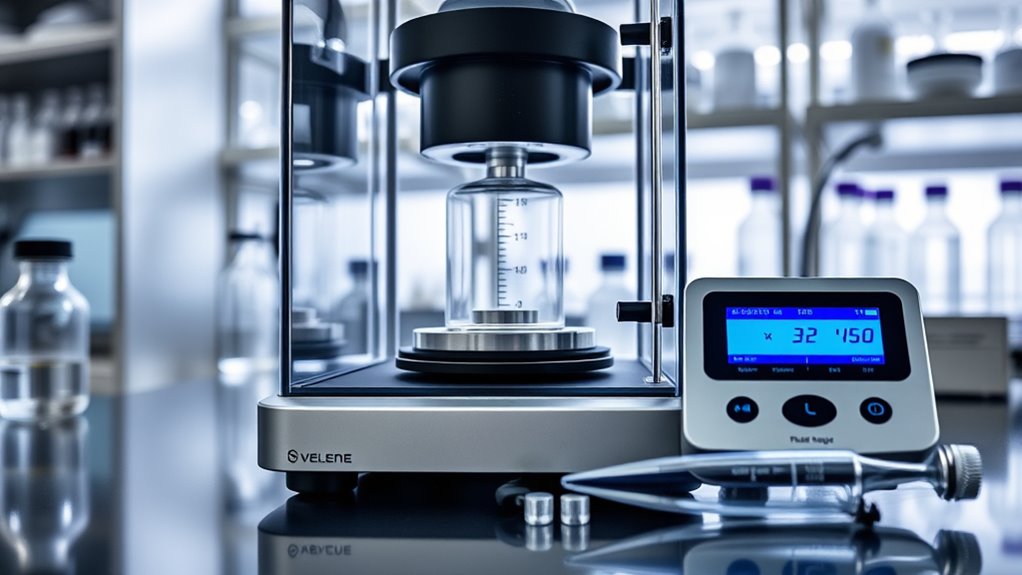
When selecting a high-precision analytical balance, I consider factors like measurement accuracy needs and maximum capacity to guarantee it fits my specific tasks. I also evaluate calibration requirements and connectivity options to maintain reliability and streamline data management. Finally, ease of operation is key to making the balance both efficient and user-friendly.
Measurement Accuracy Needs
Choosing the right high-precision analytical balance hinges on understanding your measurement accuracy needs. You should determine the minimum resolution required, such as 0.1mg or 0.01g, to guarantee precise readings for your tasks. Pay attention to the balance’s readability, which indicates the smallest increment it can display—this directly impacts measurement precision. Regular calibration is essential for maintaining accuracy over time, especially with high-precision balances. Additionally, consider environmental factors like airflow, vibrations, and temperature fluctuations, as they can influence results. An internal load cell with high linearity and reliable technology ensures consistent, trustworthy measurements. By evaluating these factors, you can select a balance that meets your specific accuracy requirements, leading to more reliable and precise measurements.
Balance Capacity Limits
Selecting the appropriate capacity for your high-precision analytical balance is crucial to guarantee accurate measurements and prevent damage. Balances typically range from 100g to 600g, depending on the model. It is necessary to choose a capacity that exceeds your usual weighing needs to avoid overloads, which can cause measurement errors or damage the load cell. Balances with higher capacities tend to have slightly lower readability and precision, so balancing capacity with your accuracy requirements is key. Consider the maximum weight of your samples and ensure the balance can handle them comfortably. Overloading beyond the specified limit can lead to calibration issues or permanent damage. Picking the right capacity ensures reliable results and prolongs your balance’s lifespan.
Calibration Requirements
Calibration is a critical aspect of maintaining the accuracy of high-precision analytical balances, especially in environments where precise measurements are essential. I look for balances that support internal or external calibration with traceable weights, guaranteeing consistent accuracy over time. Regular calibration schedules, whether daily or weekly, are essential for reliability, particularly in critical labs or industries. Some balances come with automatic internal calibration systems that adjust measurements continuously or at set intervals, reducing manual effort. External calibration using certified weights verifies the balance’s performance and ensures compliance with quality standards. It’s important that calibration procedures are well-documented and performed in controlled environments to prevent environmental factors from skewing results. These calibration features and practices are key when selecting a high-precision balance.
Connectivity Options
Connectivity options play a crucial role in guaranteeing high-precision analytical balances integrate smoothly into your lab or industrial environment. Many balances feature USB, RS232, or Ethernet ports to facilitate seamless data transfer. USB connectivity offers quick, plug-and-play setup with PCs, enabling real-time data logging and control via software. RS232 interfaces are ideal for serial communication with external devices, making them suitable for legacy systems or industrial automation. Some balances support multiple protocols, providing flexibility to match your specific data management needs. The right connectivity options can considerably enhance workflow efficiency, improve data accuracy, and ensure smooth integration with existing laboratory or industrial systems. Carefully consider your current setup and future needs when choosing a balance with appropriate connectivity features.
Ease of Operation
When choosing a high-precision analytical balance, ease of operation is key to ensuring accurate and efficient measurements. I look for an intuitive user interface with clear controls and a straightforward display, which helps minimize user errors. Features like auto-zeroing, tare functions, and quick calibration make the process smoother and maintain consistent accuracy. A well-designed weighing chamber with easy access reduces handling time and prevents accidental spills or damage. Clear, step-by-step instructions and minimal menu navigation help me perform measurements quickly without confusion. Good ergonomics, such as accessible buttons and a readable display, make prolonged use comfortable. Overall, balances with these features streamline workflow and boost confidence in measurement precision.
Environmental Factors
Environmental factors can considerably influence the accuracy of high-precision analytical balances, so I always consider how my workspace’s conditions might impact measurements. Temperature fluctuations can cause materials to expand or contract, leading to measurement errors, so maintaining a stable temperature is essential. Air currents and drafts create unstable readings, making windshields or enclosed chambers necessary for consistency. Vibration from nearby equipment or foot traffic can cause fluctuations, so I ensure the balance sits on a stable, vibration-free surface. Humidity levels matter too; high humidity can damage electronic components and cause condensation, skewing results. Electromagnetic interference from nearby devices can disrupt load cell signals, so proper shielding and placement away from EM sources are critical. Paying attention to these factors ensures reliable, accurate measurements.
Frequently Asked Questions
How Do Calibration Procedures Differ Across Various High-Precision Balances?
Calibration procedures vary depending on the balance’s design and manufacturer. I follow specific steps: zeroing the balance, using certified calibration weights, and recording results at regular intervals. Some balances require internal calibration via built-in weights or software, while others need external weights. I always consult the manufacturer’s instructions to guarantee accuracy, perform routine checks, and adjust the balance as needed to maintain precise measurements.
What Are the Maintenance Tips to Ensure Long-Term Accuracy?
To guarantee long-term accuracy, I regularly clean my balance with a soft brush and lint-free cloth, avoiding harsh chemicals. I calibrate it frequently with certified standards and keep it in a draft-free, stable environment. I also check for any signs of wear or damage and handle weights carefully. Consistent maintenance like this helps me maintain precise measurements over time.
How Do Environmental Factors Affect Measurement Precision?
Imagine a delicate scale balancing on a breezy windowsill—environmental factors like air currents, temperature fluctuations, and humidity can easily sway your measurements. These elements introduce variability, making precision difficult. I keep my balances in draft-free, temperature-controlled areas to minimize errors. By controlling environmental conditions, I guarantee consistent, accurate results, avoiding the chaos of external influences that can compromise the integrity of high-precision measurements.
Are There Specific Safety Protocols for Handling Sensitive Balances?
Yes, there are specific safety protocols I follow when handling sensitive balances. I always wear gloves to prevent contamination, handle the balance gently to avoid shocks, and ensure it’s placed on a stable, vibration-free surface. I also keep the environment clean and free of drafts, and I avoid sudden movements around the device. Regular calibration and maintenance are essential to uphold accuracy and safety.
What Are the Typical Warranty and Service Options Available?
Warranty and service options are like having a superhero team for your balance—ready to swoop in whenever you need help. Most manufacturers offer one to three-year warranties, covering repairs and calibration. Some provide on-site service, remote troubleshooting, and regular maintenance plans. I always recommend choosing a supplier with excellent customer support and quick turnaround times, so you’re never left in the dark during critical measurements.
Conclusion
Choosing the right high-precision balance can truly elevate your work’s accuracy and confidence. While it’s easy to get caught up in features, trusting your intuition and understanding your needs will guide you best. Remember, even the most delicate measurements deserve a gentle touch. With the right balance by your side, you’ll find joy in every precise step, making your lab or workspace not just efficient but also a pleasure to work in.
